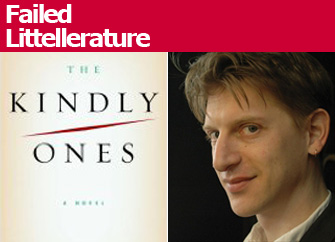
Jonathan Littell’s Les Bienveillantes, just published in English as The Kindly Ones, is rubbish. What could have been an enthralling 394-page novel on the daily grind of history’s largest war is instead a lame 1,394-page (992 in the English version) effort to have us believe the claim of the main character, (SS) Obersturmfuhrer Maximilian Aue, that “Je suis un homme comme vous” (“I am a man like you”).
Max himself tells us he had the chance to refuse to murder civilians, to be “un homme comme vous.” While Stalin was a professional thug, Hitler was an amateur who left some wiggle room for Germans in the Third Reich: “There was no penalty for refusing to kill them [Jews, Gypsies, Russians].” Why then did Max choose to slaughter men, woman and children and still feel that he could claim “Je suis un homme comme vous”? G.K. Chesterton made him do it. As Anna Russell says about The Ring of the Nibelungen, I am not making this up. Max refuses to duck behind “I was only obeying orders” and doesn’t say, “Nothing foreign is human to me,” but is persuaded to stick with the pogrom by Chesterton’s warning that fairyland is a dangerous place. Huh? This is nuts. How about choosing instead Chesterton’s “Art, like morality, consists in drawing the line somewhere.” The only reason to read The Kindly Ones is if Littell makes a case for “Je suis un homme comme vous.” The case is not made.
A Littell knowledge is a tedious thing. The author’s research has been prodigious – and you are you made to know it. There’s a scene where a scholar asks Max, “Qu’est-ce que vous voulez que je vous raconte, alors? Tout. Tout! Vous avez du temps, alors?” “What do you want me to tell you? Everything. Everything! You have the time for that?” Dear reader, you are in for it.
The only thing going for this book is its accurate descriptions of the behavior of the participants. Claude Lanzmann, the assembler of Shoah, lauds the authenticity of the novel. That’s impressive – but if accuracy made literature, the Berlin bus schedule would be taught in writing classes. There’s more writing in Noel Coward’s “Very flat, Norfolk” than in all of these clunky 1,400 pages. I opened the book at random for a short example and chose this from the official translation: “Sturmbannfuhrer Dr. Leetsch, Dr. Seibert’s replacement, was arriving that same day, accompanied by an Obersturmbannfuhrer, Paul Schultz, who was supposed to take over from Dr. Braune in Maikop; but before I could even meet him, Prill asked me to leave again for Mozdok, to inspect Sk 10b, which had just arrived there.” How almost interesting. And there’s over a thousand pages of this “littellerature.”
That Les Bienvieillants won the Prix Goncourt and that Le Monde, Le Figaro Littéraire and the Nouvel Observateur all swooned over it only tells us the condition of the Frenchtelligentsia, not the merit of the novel. The biggest problem is Littell’s pretentiousness. The novel’s headings are musical notations. Why? They’re offensive in the context of the greatest slaughters the world has ever seen. The worst pretention is explicitly making Max a 20th-century Orestes. To try to match Orestes’ dysfunctional family, Littell creates a homosexual with only one heterosexual passion, his twin sister, Una. [Surprisingly, Una is not short for Unafurtivalagrima.] Besides the homosexuality and incest, Max tells us of washing a sausage after removing it from his bum and feeding the banger, so to speak, to Mom, before chopping her up later. “Je vous dis que je suis un homme comme vous!” NOT.
The inane rationale given for Max sticking with the pogrom is matched by his whacko explanation for sliding into Una. “Tels Tristan et Yseult, cela avait commence sur un bateau” (“It began, like Tristan and Isolde, on a boat”). But while Max is into his womb-mate, Isolde is into Schopenhauer, as in “Ertrinken, versinken – unbewust – hochste Lust!” (“To drown, to sink unconscious – supreme bliss!”). There’s no resemblance between Isolde and Una, so why drag poor Isolde into this? Meanwhile, back on the yacht, the bond of incest was sparked by “l’amertume de notre enfance et le grondement souverain de la mer” (“the bitterness of our childhood and the commanding grinding of the sea”) . Whatever floats your boat, Max, but “Je suis un homme comme vous”? NOT.
One line in the book is memorable. Max has been picked up cruising in Berlin. “Do you know how dangerous your arrest is, Orestes?” asks the interrogator, who just happens to be Max’s Pylades. Orestes is threatened with transfer to someone who “has methods … that do not meet with complete approval at the Staatspolizei .. but that generally turn out to be effective.” That, suggests Pylades, can be avoided if Max joins the SS. In Max’s mordant words, “Et cet ainsi, le cul encore encore plein de sperme, que je me resolus a entrer au Sicherheitsdienst.” “And it was thus that, my bum still full of cum, I resolved to enter the SS Security Services.”
Should you give your time to this novel? No. Google instead an interview with the interesting author in Haaretz and then read Jean-Francois Steiner’s Treblinka
Read Treblinka.
Les Bienveillantes: By Jonathan Littell. Gallimard Folio collection. 1,401 pages.
Favorite
